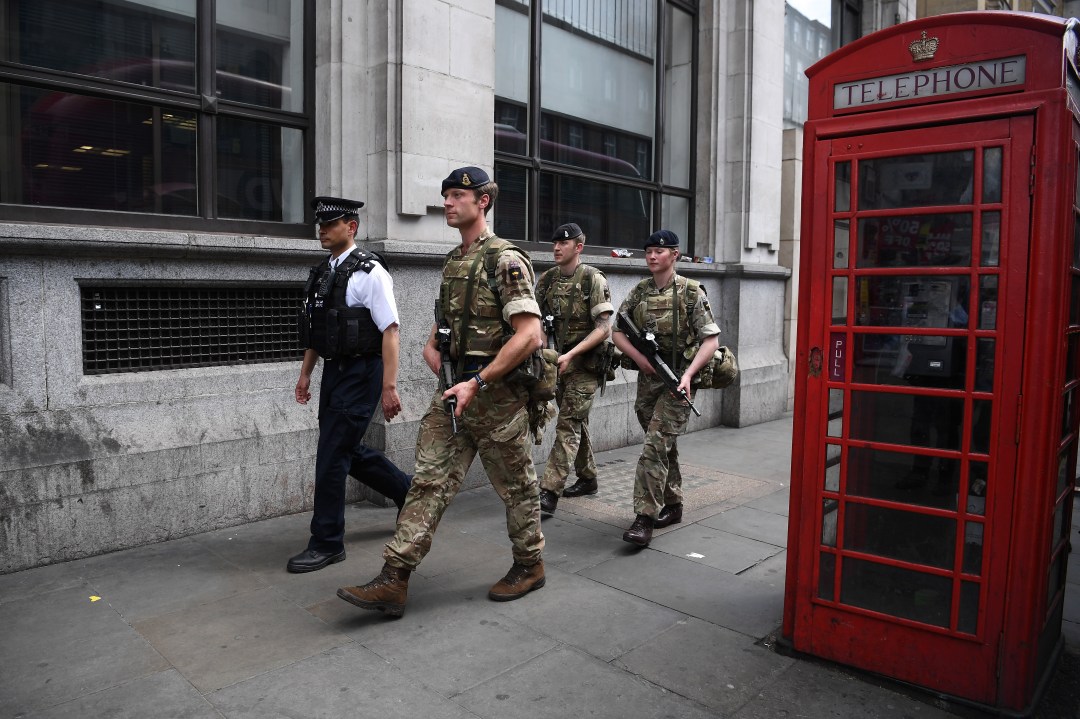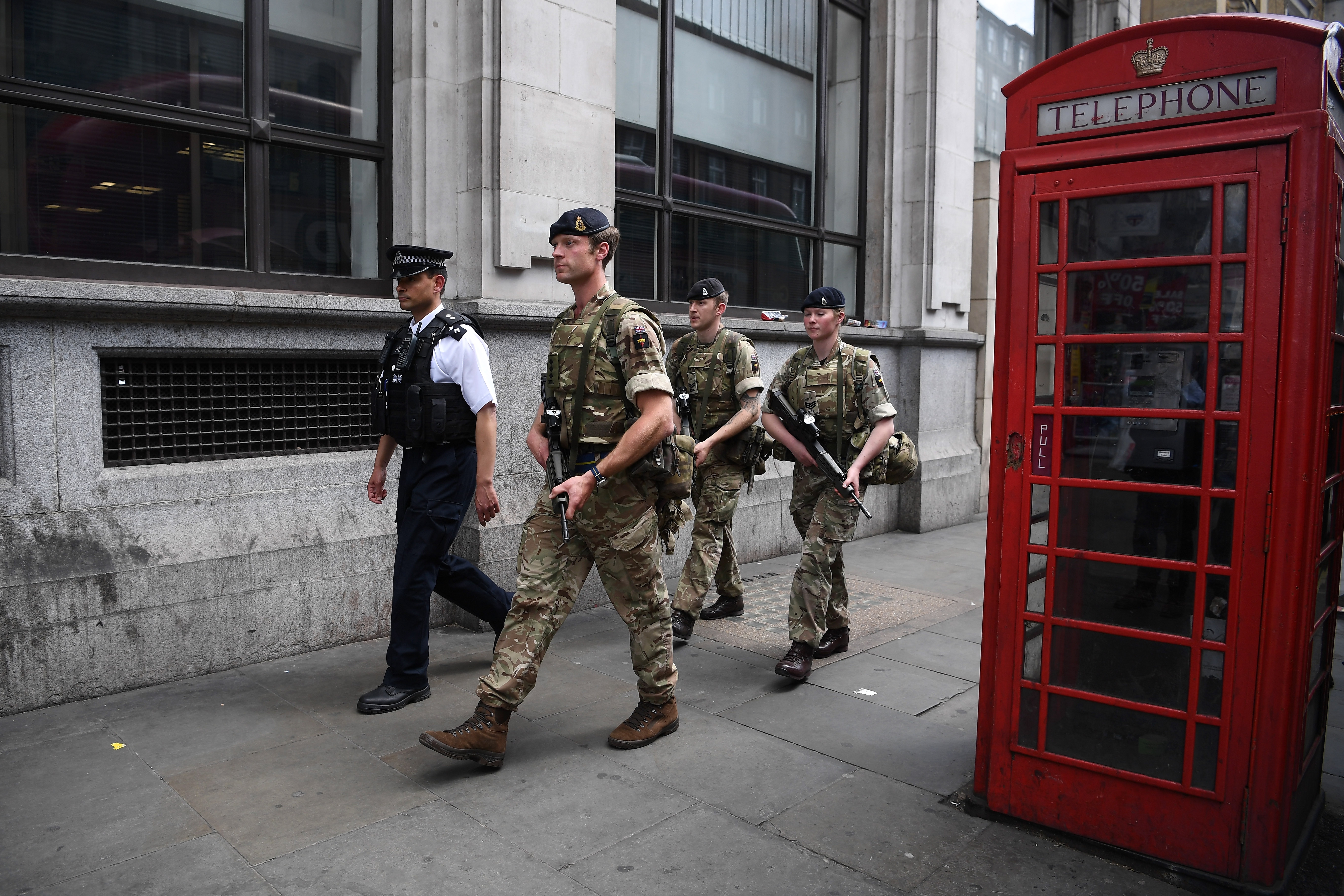In the wake of terrorist outrages such as Monday’s bombing, the British public tends to keep calm and carry on. We saw it in London after the Westminster attack in March; we saw it yesterday on the streets of Manchester – a stirring sight. That calmness in the face of evil is an attitude that has almost always been reflected by those who govern and lead us. Think of Margaret Thatcher’s steely response to the Brighton bombing. It’s the British way.
But it has, until now, also been the British way not to put troops on the streets unless absolutely necessary. It’s a delicate balance: a prime minister has a duty to reinforce the police, and after a terrorist attack it’s also natural that any democracy would be put on the highest form of alert. But you can go too far. When Tony Blair deployed armoured cars and troops to Heathrow Airport in 2003, after the threat of a missile plot, it was seen as a classic example of over-reach, which served to unnerve, rather than reassure. This is the line that Theresa May must now walk.
Douglas Murray and Haras Rafiq discuss what can be done:
It is likely, say ministers, that the Manchester suicide bomber did not act alone. There have been arrests since his appalling crime, but there could still be accomplices at large – a bomb-maker or others, possibly even with ready-made devices. It is absolutely right to step up security at this point. A friend who works in the City says that, unusually, her bag was searched and her pass checked at entry-points to at least two London landmarks this morning. That’s perfectly sensible.
More to the point, the decision to increase the UK threat level from ‘severe’ to ‘critical’, meaning an attack is ‘expected imminently’, is by no means a political one (whatever nonsense the Twitter conspiracy theorists are spouting today). The decision is taken by the independent Joint Terrorism Analysis Centre, based at the MI5 headquarters. The same decision was taken after the near-miss of the 2006 transatlantic aircraft plot, and after a plot was uncovered to bomb a nightclub on London’s Haymarket in 2007.
What is new is Operation Temperer, a controversial plan to put soldiers under police command if needs be. Theresa May’s critics say this only had to be done because she had cut police numbers so much that there aren’t enough officers to handle a major event. But the worldwide fall in crime logically means we need fewer police. If we need a military contingency plan for terrorist events then perhaps it makes sense – as long as it is carried out in a British way.
For example, the last time soldiers were involved, in the wake of the Paris attacks, they stayed behind the scenes. So the extra muscle was provided, without the alarming (and un-British) scene of soldiers patrolling the streets. And why? Because ‘troops on the streets’ can be seen as a distress signal, one picked up worldwide.
Today we’re told that there will be 984 soldiers on the streets of Britain – including in Downing Street, at the Houses of Parliament and at Buckingham Palace. All of these buildings are heavily fortified, designed to be protected against suicide bombers. They’re also much photographed. Images of soldiers at such sites send a hugely powerful message, in Britain and abroad. To some, it will be that Britain is resilient. To others, that the police can’t cope. I do also wonder if it sends another message that the jihadis have long been keen on: civil war.
Anyone who has visited Paris recently will recognise this as the French approach. In France’s current state of emergency, it is normal to see armed troops patrolling the streets or guarding key sites in the capital.
Three notes of caution, however. First, the Home Secretary has not made clear if the police actually asked for this military help. Indeed, Amber Rudd seems worryingly muddled between the terror threat level (decided by spies) and the deployment of soldiers (which isn’t). Here’s an exchange from the radio this morning:-
Sarah Montague: Now you make the point that the military supporting the police is a temporary situation. How long do you reckon it’s going to be required?
Amber Rudd: Well, that is up to JTAC who are of course independent. It will depend on the progress of the investigation and the outcomes. They will keep it under constant review. I do note that last time the threat level was raised to critical, it lasted five days and before that four days. So we will see.
This is factually incorrect – as you’d hope the Home Secretary would know. Deploying troops is not up to JTAC – they are only in charge of the national threat level. How long Operation Temperer lasts is ultimately up to the Prime Minister, and the Home Secretary herself.
How long this goes on is the dilemma now. The British model of policing is based on an idea of ‘policing by consent’, with the police’s legitimacy being rooted in the public’s permission. As Robert Peel put it famously in 1829:
the police are the public and … the public are the police, the police being only members of the public who are paid to give full-time attention to duties which are incumbent on every citizen in the interests of community welfare and existence…
This is the kind of democracy we’re defending: the sort that never asks a soldier to do a civilian’s job for a moment longer than is absolutely necessary. Something worth noting now, and bearing in mind over the next few days.







Comments